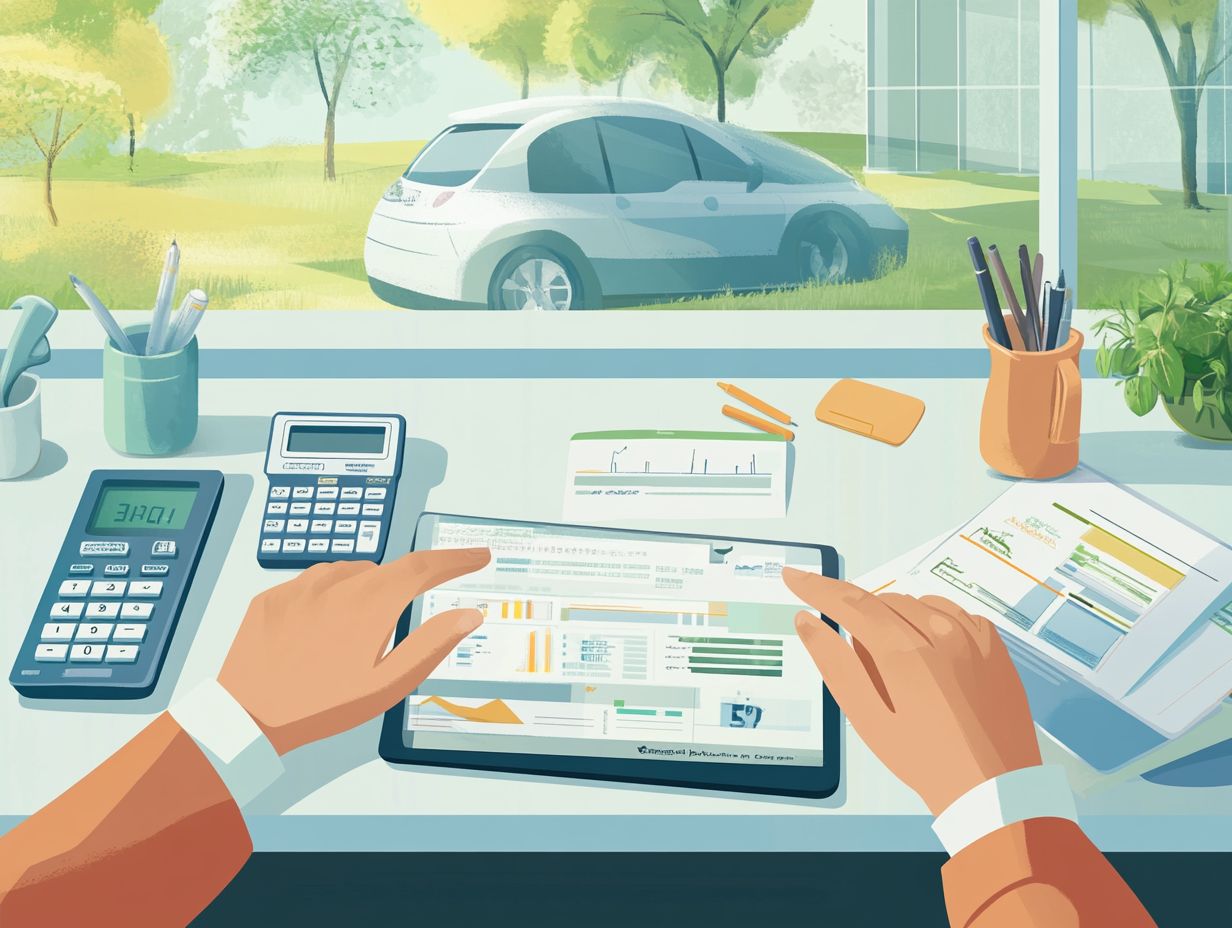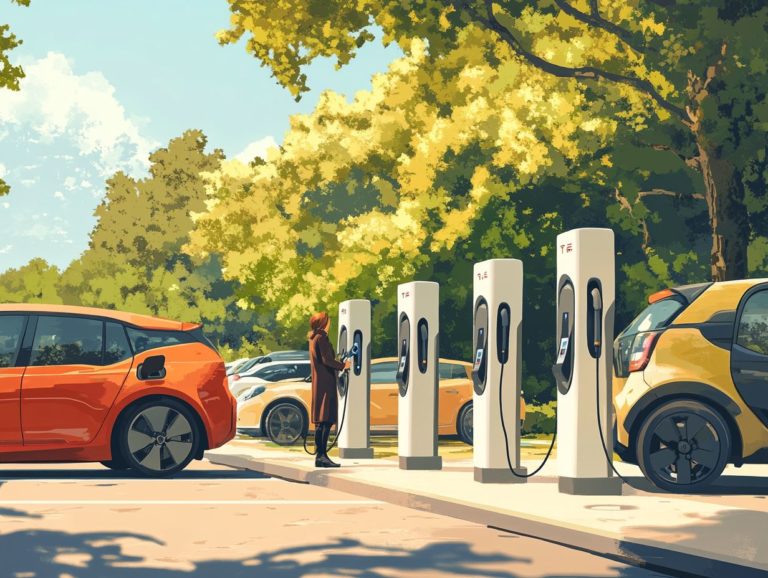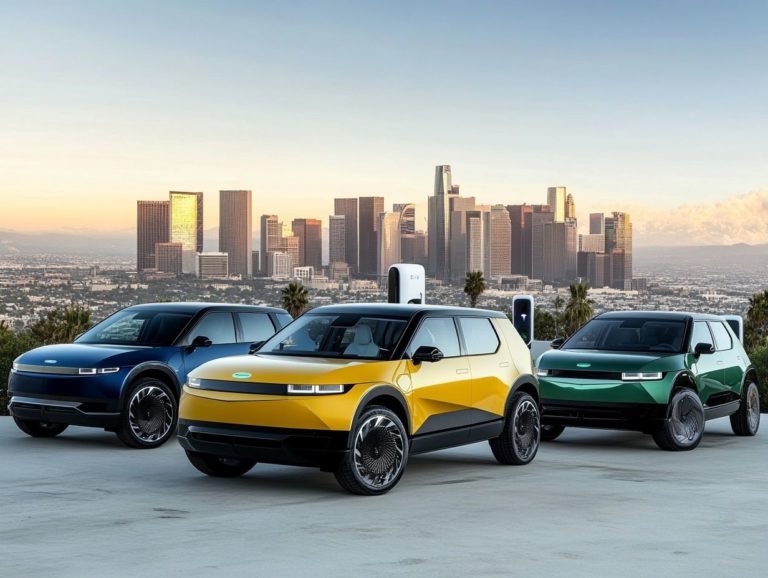How to Budget for Your First EV
Electric vehicles (EVs) are transforming our perspective on transportation, offering a cleaner and often more economical alternative to traditional gas-powered cars.
As their popularity soars, it s essential to engage in careful budgeting and gain a clear understanding of the costs associated with ownership.
This article delves into the essentials of EVs, explaining how they operate and the financial implications of purchasing and maintaining one.
Explore initial purchase prices, operating expenses, and available incentives, empowering yourself to make informed financial decisions for your first electric vehicle.
With practical tips on budgeting and financing options, you ll be well-equipped to navigate the exciting transition to EV ownership.
Contents
- Key Takeaways:
- Understanding Electric Vehicles (EVs)
- Costs Associated with EV Ownership
- Budgeting for an EV
- Financing Options for EVs
- Additional Costs to Consider
- Frequently Asked Questions
- What factors should I consider when budgeting for my first EV?
- How much should I budget for the actual purchase of the EV?
- Do I need to budget for a home charging station?
- Are there any tax incentives for purchasing an EV?
- What about insurance costs for EVs?
- How can I budget for ongoing maintenance and repairs for my EV?
Key Takeaways:

Understand the costs associated with EV ownership, including the initial purchase price, operating costs, and potential government incentives and tax credits.
When budgeting for an EV, consider factors such as driving habits, charging options, and potential financing options like leasing or loans with varying interest rates. To learn more about transitioning to an EV, check out this guide on how to prepare for your first electric car.
Don’t forget to factor in additional costs such as charging infrastructure and maintenance when creating a budget plan for your first EV.
Understanding Electric Vehicles (EVs)
Grasping the intricacies of Electric Vehicles (EVs) is essential in today s rapidly changing automobile landscape. These vehicles represent a profound transition from conventional gas-powered options to more environmentally conscious alternatives.
By leveraging advanced battery technology and innovative energy solutions, EVs minimize carbon footprints while delivering significant environmental advantages. Get excited about the amazing range of choices available to you, including popular models such as the Tesla Model 3, Chevrolet Bolt, and Hyundai Kona, each tailored to different driving habits and preferences.
What are EVs and How do They Work?
Electric vehicles (EVs) utilize cutting-edge battery technology to convert electrical energy into movement using electric motors, distinguishing them from traditional gas cars that rely on combustion engines.
This innovative approach includes key components, such as rechargeable lithium-ion batteries that store energy efficiently, directly influencing the vehicle’s range and performance. The energy efficiency is further enhanced by regenerative braking systems, which help recharge the battery while slowing down.
In contrast to gas-powered vehicles, which demand regular oil changes and are burdened with complex systems filled with numerous moving parts, EVs simplify maintenance. With fewer mechanical components, they promise significantly lower long-term operational costs.
For anyone diving into sustainable transportation, understanding these operational and maintenance distinctions is essential.
Costs Associated with EV Ownership
When contemplating owning an electric vehicle, it’s crucial to assess both the initial investment and the ongoing costs. This thorough analysis can reveal substantial savings over time when compared to traditional gas vehicles.
Initial Purchase Price
The initial purchase price of electric vehicles like the Tesla Model 3, Chevrolet Bolt, and Hyundai Kona may be higher than that of traditional gas cars. However, various EV incentives and tax credits can dramatically lower those upfront costs.
In recent years, many governments have rolled out enticing incentives to encourage the adoption of electric vehicles, ranging from direct rebates and grants to tax credits, all designed to ease the financial pressure on potential buyers.
For example, some regions offer significant tax reductions or even cash back at the point of sale. When considering the long-term savings on fuel and maintenance costs, electric vehicles can emerge as the more economical choice when compared to gas-powered cars.
Thus, these incentives not only provide immediate financial relief but also pave the way for a more sustainable and cost-effective driving experience in the long run.
Start budgeting for your first electric vehicle today and join the green revolution!
Operating Costs

Operating costs for electric vehicles typically encompass maintenance expenses, charging fees, and energy costs. These can vary significantly from those associated with gasoline cars, leading to substantial long-term savings.
Electric vehicles often incur lower maintenance costs due to fewer moving parts and no need for oil changes. This is a notable advantage over traditional gas-powered vehicles.
Many owners appreciate the convenience of charging at home, especially during off-peak hours. This can lead to lower electricity rates. Understanding local electricity rates is key, as they fluctuate widely and directly influence your total expenses.
By analyzing your local energy costs, you can see how an electric vehicle helps you capitalize on fluctuating rates, ultimately minimizing your operational costs.
Government Incentives and Tax Credits
Government incentives and tax credits are important for your move towards electric vehicle adoption. Initiatives like the Inflation Reduction Act provide financial assistance as you consider investing in EVs.
Programs from the U.S. Department of Energy offer enticing benefits, including a federal tax credit of up to $7,500 for qualifying electric vehicles. Additionally, various state-level incentives can ease the financial burden.
Local governments often sweeten the deal with rebates or grants that boost affordability. Plus, subsidies for charging station installations support better infrastructure development.
These financial perks lower the overall cost of ownership, making electric vehicles an attractive choice for those who care about the environment. By reducing financial barriers, these incentives facilitate your transition to a sustainable future and enable informed, eco-friendly decisions.
Budgeting for an EV
Budgeting for an electric vehicle involves several factors, including the initial purchase price and ongoing charging costs. To make an informed decision, it’s helpful to consider how to choose the right EV for your lifestyle.
This mindful approach ensures that transitioning from a gas-powered car ultimately translates into significant cost savings over time.
Factors to Consider
When budgeting for an electric vehicle, consider your driving habits, available charging options, and potential maintenance expenses. Understanding how to determine your EV needs can also influence your overall ownership costs.
Evaluate your daily commute and typical travel distance. These insights help determine which model is the most efficient and cost-effective for you. If you primarily charge at home, you might enjoy lower electricity rates. However, if you’re dependent on public charging stations, those variable fees could accumulate quickly.
Be aware of differences in vehicle registration fees, which can vary by region and significantly impact your overall cost of ownership over time.
Creating a Budget Plan
Creating a comprehensive budget plan for electric vehicle ownership requires calculating the total cost of ownership, considering long-term savings from reduced maintenance and fuel costs, and understanding your charging infrastructure needs. For more insights, check out how to identify your ideal EV.
To develop a well-rounded budget, factor in both upfront costs like the purchase price and the installation of a home charging station and ongoing expenses like electricity and potential charging fees.
Explore tools like electric car calculators. They can illuminate your savings over time and help you appreciate the financial advantages of driving an EV. Evaluate local incentives, rebates, and tax credits to enhance your experience and stay informed about the latest opportunities available in your area.
Financing Options for EVs

Exploring financing options for electric vehicles like the Chevrolet Bolt, Tesla Model 3, and Hyundai Kona is essential for potential buyers. This assessment will help you decide between leasing and purchasing. Each option affects your finances and lifestyle differently.
Leasing vs. Buying
The decision between leasing and buying an electric vehicle can greatly influence your total cost of ownership and financing options. It shapes your monthly payments and long-term financial commitments.
As you weigh ownership against leasing, consider how each choice aligns with your unique circumstances. Leasing often results in lower monthly payments, making it an attractive option for those who enjoy driving a new model every few years. However, leasing comes with mileage limits and potential fees for excessive wear and tear.
On the flip side, purchasing an electric vehicle gives you complete ownership, free from mileage restrictions. Yet, this option usually requires a larger initial payment, which could affect your cash flow. In leasing agreements, maintenance responsibilities generally fall to you as the lessee, while owning the vehicle places the full burden of upkeep on your shoulders. This varies based on how well you care for the vehicle.
Understanding Your Loan Choices
Understanding the array of loan options and interest rates for financing an electric vehicle is crucial for making informed decisions. This helps you select a budget-friendly car.
With many choices available, from traditional auto loans to specialized loans that support environmentally friendly purchases, you can find terms tailored to fit diverse financial situations. These options often come with varying conditions, such as initial payment needed and loan durations. It s important to note that eligibility criteria can vary based on your credit score and income levels, significantly influencing the interest rates you may encounter.
These rates can also fluctuate based on market conditions and lender policies, ultimately altering the total cost of your financing. By thoroughly assessing all available options, you can navigate the landscape, ensuring you select the most advantageous financial pathway for your electric vehicle purchase.
Additional Costs to Consider
Besides the initial purchase price and operating costs, carefully consider additional expenses associated with owning an electric vehicle. This includes the costs of charging infrastructure and maintenance, along with how these factors are shaped by the evolving EV market.
It’s crucial to get the complete picture! This understanding helps you see the full financial commitment involved.
Charging Infrastructure
Charging infrastructure plays a vital role in your electric vehicle ownership experience. It s essential to consider both home chargers and the availability of public charging stations to ensure accessibility and convenience.
Understanding the range of options available can greatly enhance your experience with an electric vehicle. Home chargers offer the luxury of charging overnight, making them a favored choice for many owners. On the other hand, public charging networks provide crucial flexibility for those who may not have the option to install a charger at home.
The availability of charging stations can vary significantly based on your geographic location; urban areas typically feature a denser network compared to rural regions. This is why having a reliable charging plan is essential. It enables you to navigate your journeys with confidence, free from the anxiety of running out of power unexpectedly.
Start exploring your financing options today to make your electric vehicle dreams a reality!
Maintenance and Repairs

Electric vehicles typically boast lower maintenance costs compared to gasoline cars. This is due to their fewer moving parts and reduced need for repairs, translating into significant savings over time.
The drop in maintenance requirements is largely because of the elimination of oil changes, fuel filters, and exhaust systems that traditional vehicles contend with. The simple design of electric engines means that many common gas engine issues such as valve adjustments and transmission repairs are non-existent.
You can enjoy the peace of mind that comes with reduced upkeep as well as notable savings on repair expenses. EV components like batteries and electric motors are designed to last longer than their gasoline counterparts. This built-in durability further enhances the cost-effectiveness and sustainability of switching to electric vehicles.
Frequently Asked Questions
What factors should I consider when budgeting for my first EV?
When budgeting for your first EV, consider factors such as the car’s cost, charging infrastructure, insurance, and potential tax incentives. To prepare effectively, refer to this guide on how to prepare for your first EV purchase. Make sure to research thoroughly and create a comprehensive budget to ensure a smooth transition to electric vehicle ownership.
How much should I budget for the actual purchase of the EV?
The cost of an EV varies greatly depending on the make and model. On average, EVs range from $30,000 to $60,000. Determine your needs and budget accordingly. Remember that EVs also have lower maintenance and fuel costs compared to traditional gas-powered cars.
Do I need to budget for a home charging station?
It’s a good idea to budget for a home charging station for convenience and quicker charging times. The cost can range from $500 to $1,500, depending on the type and installation fees. However, public charging stations are also an option if available in your area.
Are there any tax incentives for purchasing an EV?
Yes, there are federal and state tax incentives available for purchasing an EV. These can range from $2,500 to $7,500, depending on the state and the car’s battery size. Research and factor in these incentives when creating your budget.
What about insurance costs for EVs?
Insurance costs for EVs can vary, but on average, they are slightly higher than traditional gas-powered cars. Many insurance companies offer discounts for EV owners. Shop around and compare insurance quotes to find the best deal for your budget.
How can I budget for ongoing maintenance and repairs for my EV?
One major benefit of EVs is their lower maintenance costs compared to gas-powered cars. However, it’s still important to budget for routine maintenance and potential repairs. Keep in mind that EVs have fewer moving parts and may require less frequent maintenance. Still, having a budget for unexpected repairs is wise.
Ready to make the switch? Experience the benefits of electric vehicles today!






